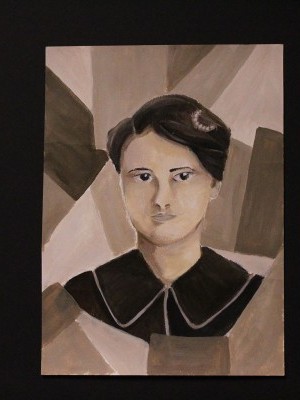Rebecca Tabor
Columbus High School | Columbus, GA | 12th Grade
Inspirational Family Member
My Great-Great-Grandmother
Nora Annaline Grisham was born on October 28, 1893 in Todd County, Kentucky, on a family farm. She was married in 1913 in Elkton, Kentucky. Her husband was from Illinois, and had a job on the railroad so the two moved around quite a lot. Nora followed him to Cheyenne, Wyoming, living in a boxcar in order to keep her family together. Around 1921, Nora decided to move back to Tulsa, Oklahoma, because she was pregnant with her third child. Most of the time she was alone because of her husband’s work, and she had two more children in 1923 and 1925. She did odd jobs on her own, like sewing and laundry, in order to make money and keep the family together. Nora was the head of her family, fairly progressive for her time, and developed a more self-reliant personality as a whole.
As an independent young woman, Nora taught her children the importance of making use of their right to vote as she did, both the boys and girls. She often enjoyed freely traveling to shop and to the movie theater. However, one day, when her husband came home, he requested that she stay instead of going to see the movies. She got angry and demanded that she be able to go to the movie theater alone. The two argued, and Nora eventually stormed out, irritated. When she left home, she was hit by a bus and died of her injuries on February 29, 1939. Even on the day she died, Nora displayed a strong commitment to her own freedoms and independence, as well as demonstrated her ability to make her own decisions and hold her own.
During Nora’s time, the Progressive Era had taken off, and by 1920, around when Nora’s third child was born, women had just received the right to vote with the 19th amendment. Even so, women would not receive the right to many other things until much later after Nora’s life, including contraceptives and abortion. Her experience is far unlike anything I will ever know. While women’s rights do have their struggles in the modern world, particularly with equal pay, they are greatly improved upon. Women now enjoy more opportunities available to them, as well as the right to vote. I admire those before me, and the lengths they took to simply have equality and freedom that should have been granted to them long ago.
Historical Figure I Admire
Ida B, Wells-Barnett
Ida B. Wells was born as a slave in Mississippi in 1862, just a few years before the Civil War ended and slavery became illegal. Her parents, Jim and Lizzie Wells, were one of the few families who were financially independent, and thus, were able to send her and her siblings to school (Moretta 7). When she was older, she moved to Memphis, Tennessee, in order to work as a teacher. While traveling from home to work, Wells had to take the train. However, Tennessee had just passed its first Jim Crow Law, segregating the train (Moretta 12). She was ordered by the conductor to take a place in the smoker’s car, filled with white, single men, rather than in the ladies’ car. This blatant denial of her right to safety angered Wells, and she refused to go to the other car. Eventually, she chose to leave the train, rather than be taken to another car (Moretta 13).
This experience spurred on her passion for journalism, and she began to write anonymous columns for the Living Way on the racial injustices she saw and experienced in her life. After receiving her first paid job for the American Baptist, Wells earned the name “Iola, Princess of the Press” (Moretta 16). Sometimes though, her tenacity costed her. She lost her teaching job after criticizing the Memphis school system for unequally treating black and white students in schools, and felt betrayed when no one else stood up for her (Moretta 20).
Wells found her true lifelong cause when she heard of the Curve lynching. One of Wells’ friends, Thomas Moss, along with two other black men, were lynched by a white mob who believed the men had been responsible for a gunfight which injured three deputies. Most of the lynchings at the time were black men who had been accused of sexual assault. However, no such accusations were in this case (Moretta 23). After realizing that the Curve lynching had been motivated by false information, Wells began looking into other sexual accusations against black men. She discovered that most of them had been faked (Moretta 25).
As Wells grew older, she began to focus on women’s rights. Since the women’s suffrage movement was in full swing by the 1900’s, Wells decided to involve herself with the Women’s State Republican Committee (Moretta 49). She worked to eradicate racism within the women’s suffrage movement. An association, called the National American Women Suffrage Association, was notorious for discriminating against African American women in order to gain the support of Southern women. Wells noted this obvious racism, and instead showed her support for more inclusive movements, such as the Alpha Suffrage Club. Even so, she faced opposition from African American men (Moretta 50).
In her lifetime, Ida B. Wells-Barnett experienced a great deal of discrimination, though she also lived long enough to see the 19th amendment to the Constitution pass. Her experience, not only as a former slave as a child, but as a free African American woman in the antebellum South, meant that it was even more difficult to make her voice heard. Yet, despite all odds, Wells was able to accomplish this, and risk her job in order to spread the truth about racism and its extent in the South, as well as in the women’s suffrage movement, in order to help gain rights for all women, including people of color. Though her influential work was not truly understood until the 1960’s, Wells had a great impact on not only racism in America, but also women’s suffrage.
SOURCES +
What the Project Means to Me
From researching incredible, influential women such as Ida B. Wells-Barnett, as well as women closer to home, like my great-great-grandmother Nora Grisham, I have gained not only a new respect for those women before me, but an appreciation for my current freedoms as a woman in America. Being able to connect to and understand my ancestors, particularly the struggle my great-great-grandmother went through was very enlightening. I appreciate not only the equal rights I have been given, but also the ability to exercise my right to vote, as I will be eighteen years old in May 2020, and thus be able to participate in the presidential election that fall. My eligibility to vote occurring on the centennial of women’s suffrage resonates strongly with me. Those who came before me worked incredibly hard simply to have rights that should have already been in place.
Voting is important, whether it be on local, state, or federal level. Having the ability to select the people who create laws and enforce them is very significant. It enables the voters to have a greater amount of control over their future and government, and it provides a sense of responsibility and independence for individuals. Not being able to vote, or have a part in any decision, can be devastating for those not allowed to do so. It can cause a majority to take advantage of them, thus those elected would not consider the minority’s needs. Voting on all levels, for a city, state, or country, impacts those in the corresponding communities. All voices need to be heard and acknowledged in their own right, and not discarded.
Explore the Archive
Deadline Extended
There's still time to join Women Leading the Way.
Become a part of our storytelling archive. Enroll your class today.
Join the Project


